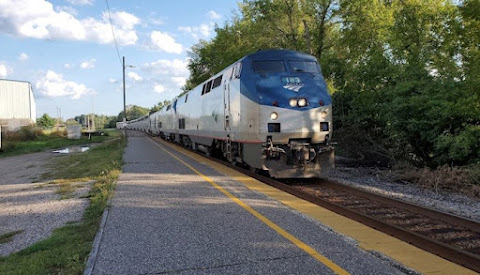Green Bay Packers President and CEO Mark Murphy on May 24 mentioned the team had contacted Amtrak about passenger service to help bring some of the expected crowd of 240,000 people to Green Bay. In a May 31 interview, Marc Magliari, an Amtrak spokesperson, said discussions have been informal so far, but there are precedents for that type of charter train service and the company is interested, but that there are questions to be answered before Amtrak could say "yes."… In the case of Milwaukee to Green Bay for the draft, the Packers — or another business or organization — could contract with Amtrak for the rail trip or trips. Amtrak would provide the trains, cars and staff, and the contracting organization would then be tasked with selling seats. In past years, Amtrak ran a charter train to the Kentucky Derby, for example. And, Magliari said, a one-off charter trip between Denver and the Winter Park Ski Resort a few years ago has led to a six-year contract to run the Winter Park Express route every Friday, Saturday and Sunday in January, February and March.US DOT Secretary Pete Buttigieg mentioned the “huge potential” of Amtrak expansion in the Upper Midwest when ex-Mayor Pete was in Green Bay a couple of weeks ago to promote a sizable grant that the Port of Green Bay received. We already know Milwaukee-to-Green Bay service has been mapped in Amtrak’s future possibilities, along with bringing service to Madison 12 years after Scott Walker put the kibosh on the idea, as part of a significant expansion in funding that was part of the most recent infrastructure bill. Passenger rail will also be part of this week’s JFC discussions on the Transportation budget, and the Legislative Fiscal Bureau discussed some of the increased options that are now available for Amtrak and other rail travel. And one of the more immediate items to deal with involves increasing rail service in another part of our state in the next few months.
Wisconsin's share of operating costs for the new Twin Cities-Milwaukee-Chicago (TCMC) service are estimated by DOT to be $303,100 in 2023-24, and $518,100 in 2024-25. The TCMC project will eventually provide one additional daily round-trip between Chicago and the Twin Cities to augment Amtrak's current Empire Builder service, with stops in St. Paul, Red Wing, Winona, La Crosse, Tomah, Wisconsin Dells, Portage, Columbus, Milwaukee, General Mitchell International Airport, Sturtevant, Glenview, and Chicago's Union Station. Through an agreement with partnering states (Illinois and Minnesota) and Amtrak, Wisconsin will share in the costs of operating the service. TCMC service is currently scheduled to begin in September, 2023. TCMC-related design improvements and construction projects will begin in early 2024, and conclude mid to late-2025. Since the TCMC service will use existing routes, and the planned construction projects are only intended to improve train movements and flow, TCMC service can begin prior to construction. The service is estimated to have $14.4 million in annual operating costs and is projected to generate annual revenue of $6.1 million, resulting in $8.3 million remaining in net operating costs that would need to be covered. TCMC operating costs for the first three years of service will be partially offset by the receipt of a $12.6 million federal grant received by partnering entities, which will pay for 90% of operating costs in 2024, 80% of costs in 2025, and 70% of costs in 2026. The remainder of net operating expenses will be paid for by the three participating states, with Wisconsin and Minnesota each paying a 35% cost-share, and Illinois paying the remaining 30% share. In 2026, it is estimated that Wisconsin's share of cost will equal $0.8 million. According to the Department, the agreement between Wisconsin, Minnesota, Illinois, and Amtrak is still under development, so some aspects of these costs will likely change once the agreement is finalized. Also, similar to the Hiawatha agreement, DOT will have an annual payment to Amtrak that will depend on the route's farebox revenues and actual costs incurred.That annual payment on the Chicago-Milwaukee-Twin Cities train is estimated to be $303,100 in the 2023-24 Fiscal Year, and $518,100 for 2024-25, which doesn’t seem like a bad deal for more frequent service (and likely at a more convenient time).
Coming our way? There are also $7 million in state funds budgeted for “nuts and bolts” capital work on rail lines that would be scheduled for next year, and another $2.5 million in Fiscal Year 2025. This includes contributions to upgrade WisDOT rail fleet and locomotive upgrades, but also includes some specific projects.
• Muskego Yard freight bypass of Milwaukee Intermodal Station (MIS) (which allows freight trains to avoid using the same tracks as Amtrak, helping ease congestion for both types of rail)JFC could turn down any or all of these projected upgrades, but given the additional usage of the rail lines with the new Midwest regional service, it makes sense that there would be an additional need to do work on the rail lines and install improvements. The other wild card would be whether the state could have more announcements from Secretary Buttigieg, this time for federal grants to help the state and local communities build up its rail infrastructure. While the infrastructure bill seems to have given automatic increases for highway funds and other types of aids, it looks like most of the increased FED rail aids are case-by-case. Some immediate upgrade funds from DC would change the calculus quickly in terms of what we can and can't do for passenger rail in this state, but either way, it certainly looks like there will be more opportunities for Wisconsinites to ride the rails soon enough.
• [Milwaukee Intermodal Station] signal and centralized train control (CTC) upgrades
• Milwaukee Airport Railroad Station (MARS) second platform
• Hiawatha next generation equipment acquisition and implementation


No comments:
Post a Comment